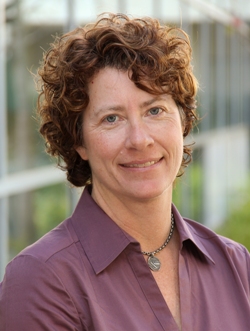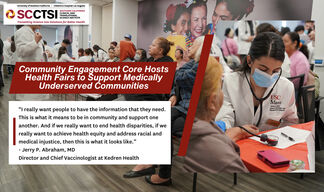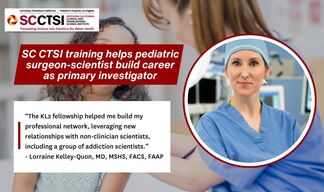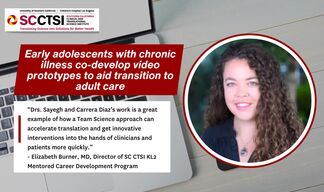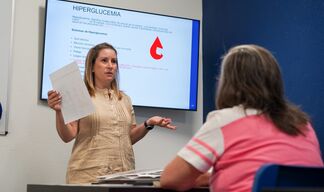Addressing Inequities in Care for Latino and African American Children with Autism
The SC CTSI Community Engagement team worked with local families and providers to find out where the health care system stumbles.
Studies show no difference in the rate of autism spectrum disorders according to ethnicity. But children in African American and Latino families are typically diagnosed six to eight months later than white children – months that can make a big difference for a child on the autism spectrum, and for their families, explained Michele Kipke, PhD, SC CTSI Co-Director and Director of the institute's Community Engagement program.
Children diagnosed before age three, for example, are eligible for certain publicly-funded early intervention programs. These programs have been found to provide children with autism increased opportunities, positioning them to have the best possible outcomes. After the age of three, those programs are no longer available.
To ensure that African American and Latino children with autism spectrum disorders are correctly diagnosed and treated, researchers at the Southern California Clinical and Translational Sciences Institute (SC CTSI) have proposed to create novel community-based teams of specially trained health care advisors to help parents and families get a screening and diagnosis, and more quickly access needed services.
"Early intervention is critical for the long-term health and developmental trajectory of these children, with as much as a third of children with autism experiencing significant medical co-morbidities, such as seizure, and gastrointestinal or sleep disorders," said Kipke, Vice Chair of Research in the department of Pediatrics at Children’s Hospital Los Angeles and Director of the Community, Health Outcomes & Intervention Research program at The Saban Research Institute. "Our goal is to prevent disparities and make sure every child is linked with care."
To investigate why Latino and African American families have a tougher time obtaining autism-related care and services, the SC CTSI Community Engagement program forged research partnerships with the Autism Speaks Autism Treatment Network team at Children’s Hospital Los Angeles, non-profit organizations such as Autism Speaks, and the County Regional Centers that deliver services to children with autism spectrum disorders.
Through these partnerships, the research team recruited 56 Latino and African American parents to take part in focus groups. The researchers wanted to develop a clear picture of the experience mothers and fathers have when they seek care for their children, explained principal investigator Katrina Kubicek, assistant director of the SC CTSI Community Engagement program.
The research team learned that many parents visit family doctors or physicians at community clinics – not pediatricians – when children exhibit atypical behavior or development, such as an apparent loss of previously acquired speech abilities.
"More often than not, doctors told parents not to worry, that the child would be fine in a year or two, rather than referring the child to a developmental specialist for evaluation," said Kubicek, who is program manager in the Community, Health Outcomes & Intervention Research program at The Saban Research Institute. "That led to missed and delayed diagnoses for some families."
The researchers also learned of cultural barriers that made some families reluctant to seek help, due to the stigma associated with an autism diagnosis.
Based on the focus groups, investigators recommended the development of community-based teams of health care workers called promotoras – lay Latino community members trained to help their lead healthier lives.
The promotora model has already proved successful in many Latino communities in California, where they have raised awareness about heart health and diabetes, helped families sign up for health insurance, and provided other assistance.
SC CTSI is now developing a curriculum to train promotoras in autism-related issues. The research team is currently working with parents and autism care professionals to develop interventions that would employ promotoras to address the primary needs revealed during the focus groups, including:
- education to improve understanding of autism spectrum disorders,
- help navigating public and private services, and
- guidance about legally or individually advocating for their children's needs.
If successful, the curriculum could be replicated in communities around the country.
"The SC CTSI is looking at a range of strategies to help patients navigate very complicated, often very bureaucratic healthcare delivery systems," said Kipke. "Use of promotoras is one of the strategies we are exploring to help equip parents with information about early child development and the tools needed to successfully access services for their children."
Related Story:
